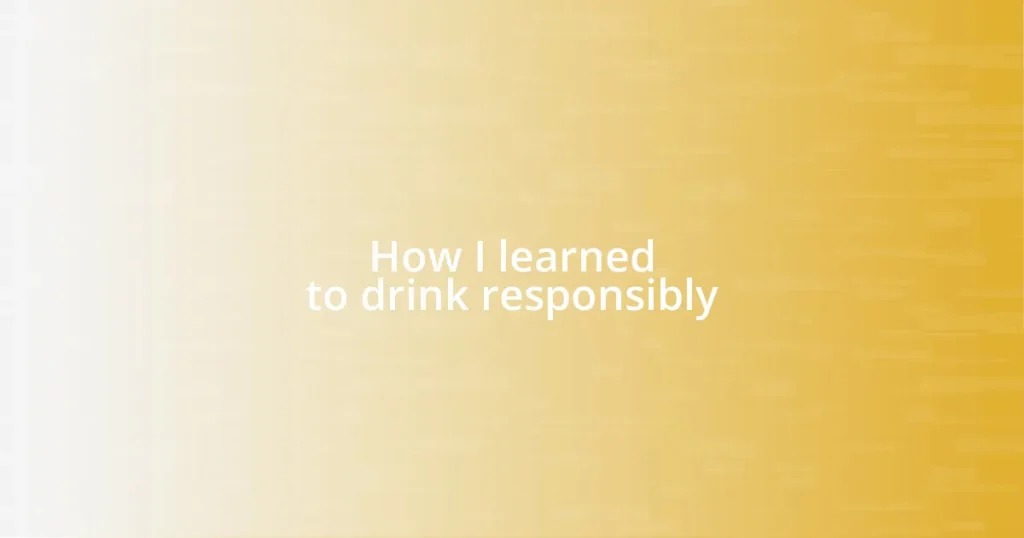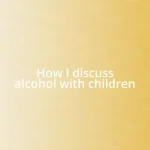Key takeaways:
- Responsible drinking involves self-awareness, recognizing limits, and understanding social cues.
- Setting personal limits, such as drink count goals and hydration breaks, enhances enjoyment and prevents overindulgence.
- Mindful drinking encourages savoring experiences and connections rather than numbing them with alcohol.
- Implementing strategies like a buddy system and engaging in non-alcoholic options promotes responsible habits and fosters supportive social environments.
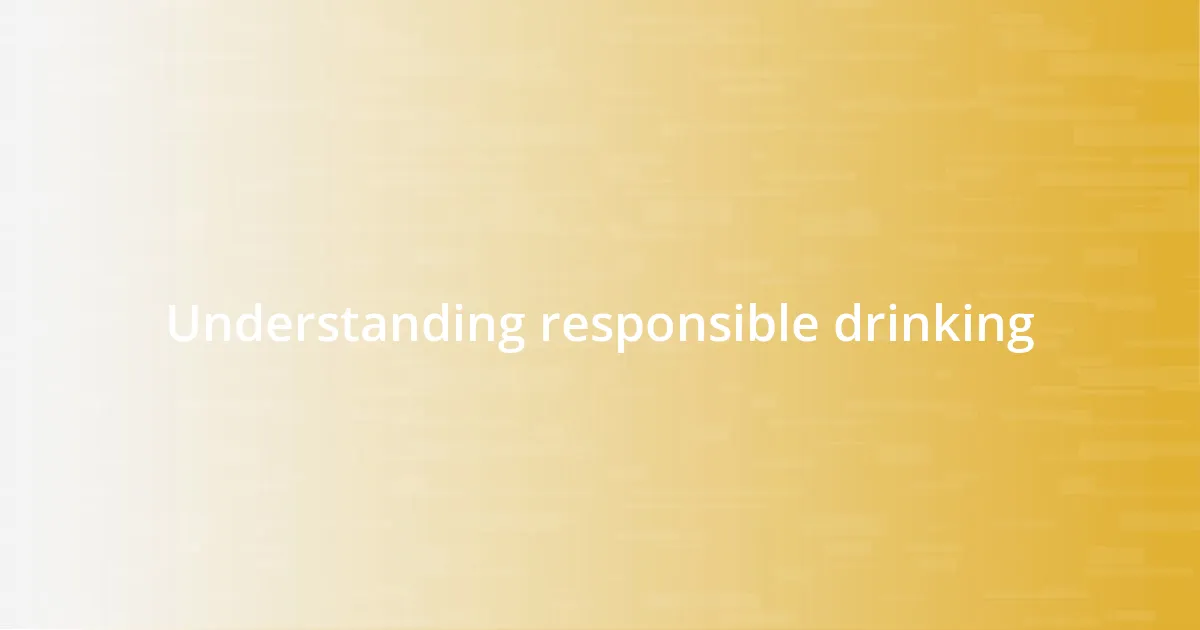
Understanding responsible drinking
Understanding responsible drinking is more than just knowing your limits; it’s about being in tune with your body and emotions. I remember a night where the thrill of celebration led to one drink too many, leaving me feeling embarrassed the next day. It made me wonder—how often do we let the moment sweep us away without considering the consequences?
A personal moment sticks out in my mind. During a friend’s wedding, I took a step back and observed my friends. Those who sipped slowly seemed to enjoy their conversations more, while others who rushed through their drinks ended up feeling woozy and disconnected. This contrast made me realize that drinking responsibly not only enhances enjoyment but fosters deeper connections. Isn’t it interesting how a simple choice can shape our experiences so profoundly?
As I learned more, I understood that responsible drinking also involves recognizing social cues and environments where drinking might not be appropriate. I once went to a party where the atmosphere was tense and chaotic; I chose not to drink that night, and it turned out to be the best decision. Reflecting on that experience highlighted the importance of situational awareness in responsible drinking—isn’t it better to actively engage with those around us rather than risk losing ourselves in the noise?
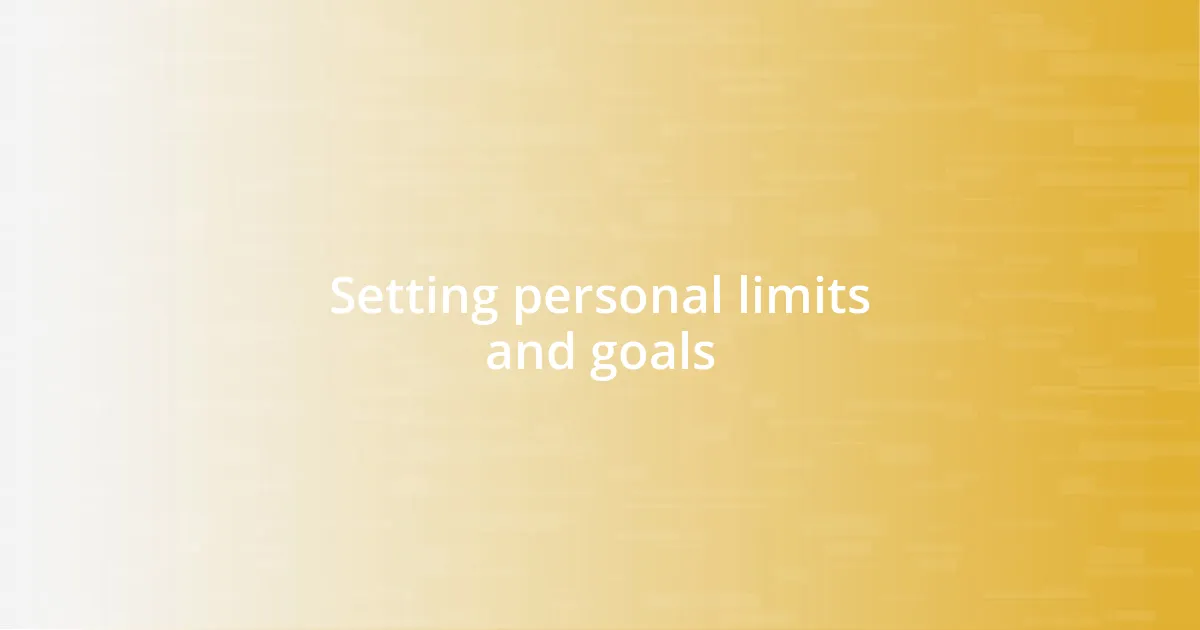
Setting personal limits and goals
Setting personal limits and goals is crucial in my journey toward drinking responsibly. I learned to decide on my drink count before entering social situations—this way, I was less likely to get swept up in the moment. For instance, at a recent birthday party, I committed to two drinks and stuck to it, allowing me to mingle without losing track of my enjoyment or my surroundings.
Establishing limits helped me navigate occasions without feeling pressured. I recall a holiday gathering filled with friends and plenty of cocktails. Before going, I set a goal: to drink only during the first half of the event. By doing so, I enjoyed the festivities and still had energy for conversations long after my friends had faded into their cups.
Ultimately, having clear goals reminds me that drinking should enhance my experience, not dominate it. I remember a summer barbeque where I opt for water between drinks. This choice not only kept me hydrated but also allowed me to savor the flavors of delicious food while connecting deeply with friends. The experience showed me that mindful limits can transform drinking into a pleasurable enhancement rather than a regrettable habit.
| Setting Limits | Benefits |
|---|---|
| Drink Count Goals | Helps avoid overindulgence |
| Time-based Drinking | Ensures enjoyment throughout the event |
| Hydration Breaks | Enhances experience and prevents negative outcomes |
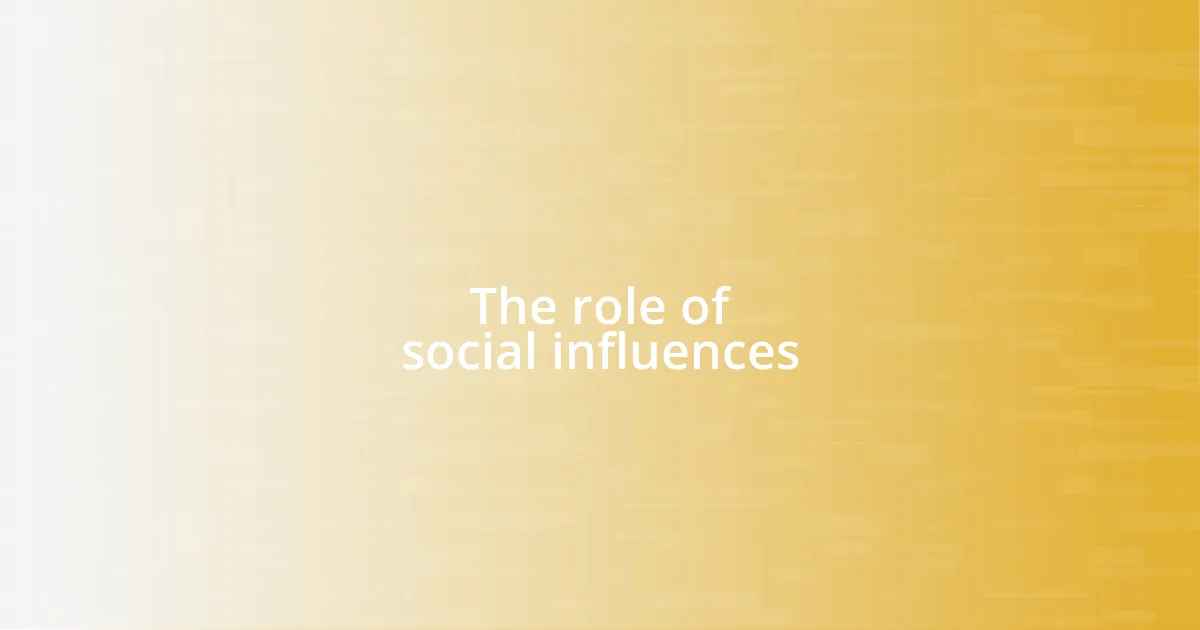
The role of social influences
Social influences can significantly shape our drinking habits, often in ways we may not realize until after. I vividly recall a night out with friends where the atmosphere was electric, and the anticipation of the evening led to a few too many rounds. Peer pressure can be subtle, and the desire to fit in or keep up with others can easily overshadow our better judgment.
Consider these points about social influences:
- Cultural Norms: Many social gatherings revolve around drinking, creating an unspoken expectation that everyone should partake.
- Group Dynamics: I noticed during a lively bar outing that those who ordered drinks first often influenced others to do the same, even those who might’ve preferred to abstain.
- Maturity Levels: Different age groups often have varying perceptions of what constitutes fun, impacting how we view drinking within our circles.
Being mindful of these influences has helped me make more conscious choices. I learned to assess what I truly wanted, rather than simply following along. It’s about finding that balance and savoring moments without feeling pulled in by the crowd.
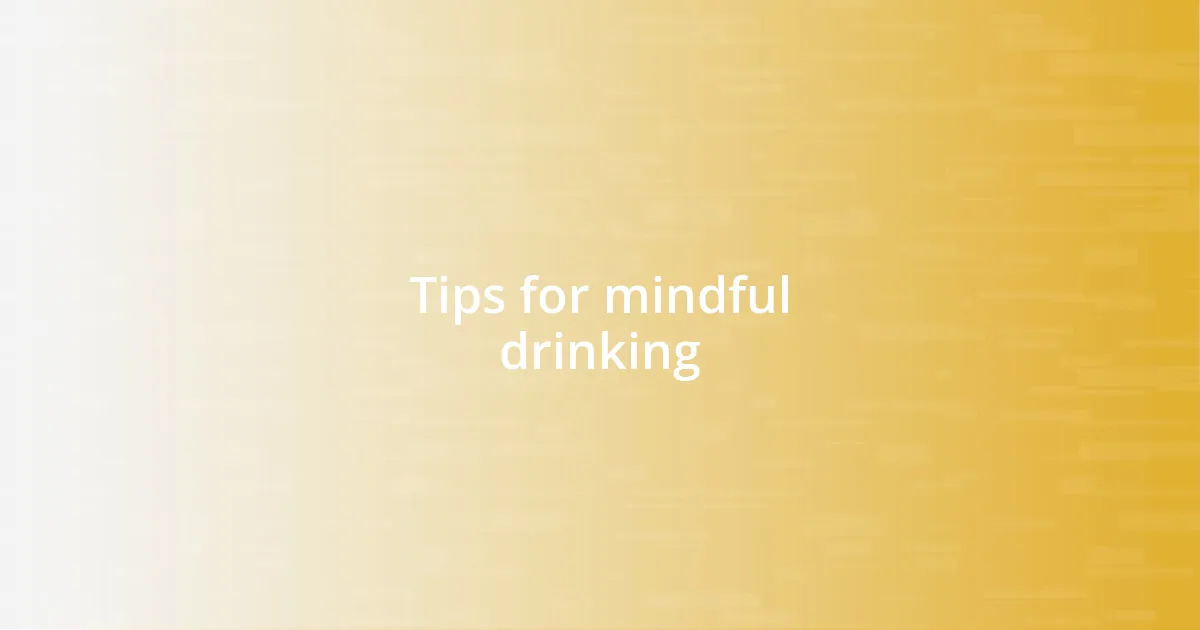
Tips for mindful drinking
When it comes to mindful drinking, I can’t stress enough the importance of being present. One night, I attended a concert, and instead of grabbing a drink the moment I entered, I took a moment to soak in the atmosphere. Just standing there, listening to the opening act while enjoying a water bottle I had brought, I felt more connected not only to the music but also to the people around me. It made me wonder: how often do we let drinks numb our experiences instead of enhancing them?
Listening to your body is another key tip I’ve found invaluable. There was a time I noticed myself feeling lightheaded after a couple of cocktails, and I realized I wasn’t truly enjoying them. So, I began to pay attention to my energy levels and hydration needs. One evening, my friends and I were exploring a new bar. Every drink I sipped, I also made sure to drink a glass of water, which surprisingly elevated my enjoyment and kept the night fun instead of fuzzy. Have you ever considered the power of hydration in your drinking habits?
Ultimately, it’s about crafting an environment where you feel empowered to choose your path. I recall a gathering where I suggested a new tradition: a non-alcoholic drink station filled with unique mocktails. That small addition transformed the whole dynamic of the evening—people mingled more freely, enjoying flavors beyond just alcohol. It made me reflect: what if we shifted the focus from drinking to connecting? Mindful drinking is about creating memorable experiences, ultimately enhancing your enjoyment without the hangover regrets.
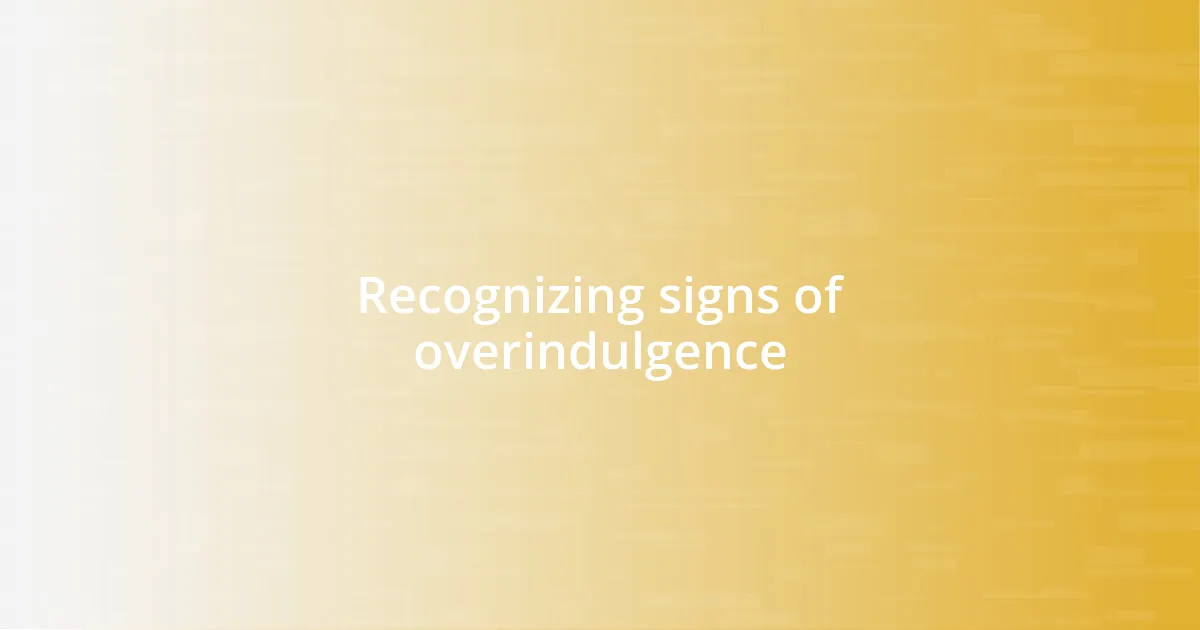
Recognizing signs of overindulgence
Recognizing when I’ve had too much can be tricky. I remember a recent holiday party where laughter filled the air, but there was a distinct moment when the laughter turned into slurred speech. It hit me then that my body was sending signals—maybe those extra drinks weren’t enhancing my enjoyment after all. When do you usually notice those signs creeping in?
I’ve also become acutely aware of how overindulgence can dampen my emotions. There was an evening I went to celebrate a friend’s promotion, and while the drinks flowed, I felt my excitement dimming into a haze. It made me question: how often do we mistakenly associate celebratory moments with drinking too much? Those moments revealed to me that genuine joy should shine through clearly, not be blurred by alcohol.
Then there’s the matter of physical sensations. A time when I experienced a heaviness in my stomach after a few too many opened my eyes to the pitfalls of overindulgence. I asked myself, “Is this really worth it?” A small reflection like that could save me from feeling that regret the next day. Recognizing these signs has been vital in helping me maintain control while still enjoying life.
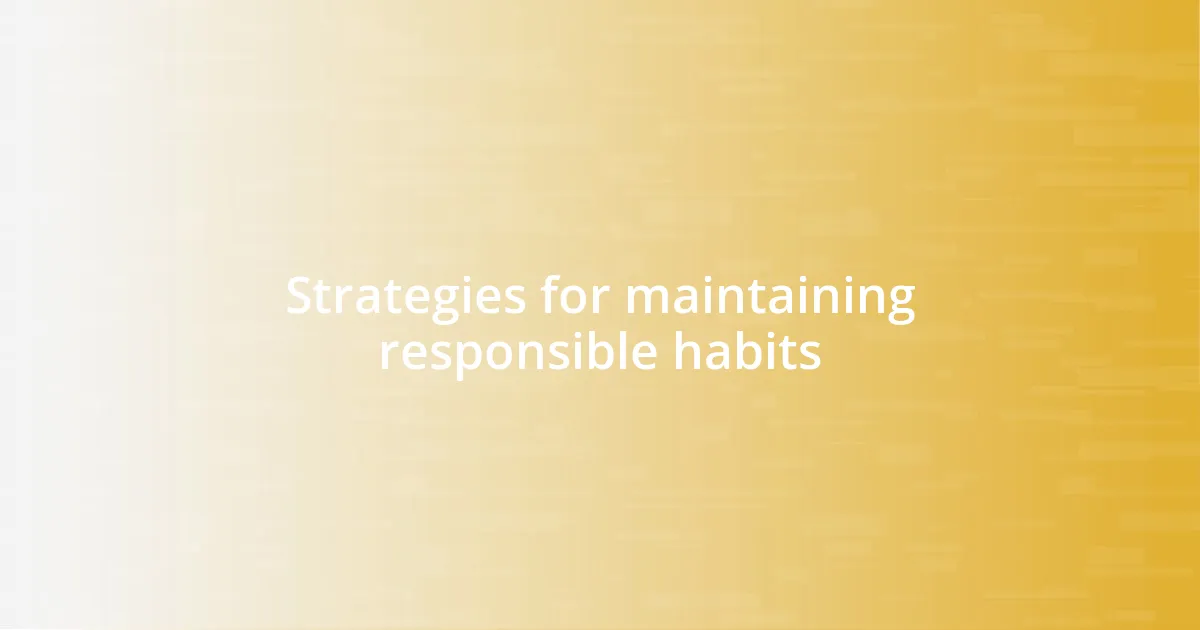
Strategies for maintaining responsible habits
Staying aware of my drinking environment has been a game changer for me. I remember one evening out at a friend’s birthday party, surrounded by high energy and unlimited drink options. Instead of defaulting to the usual rounds, I took some time to scope out different beverages. By bringing my own interesting non-alcoholic drink and engaging in conversations, I found myself energized by the connections rather than dulled by the drinks. How often do we forget the impact our surroundings have on our choices?
Another strategy I’ve developed is setting personal limits. One night, I noticed that I often lose track of how much I’m drinking when I’m deeply engrossed in conversations. So, I started bringing an index card with a mark for every drink. This little act made me pause and be more intentional about what I was consuming. It made me wonder: aren’t we worth that extra effort to stay aligned with our intentions? Since then, I’ve felt empowered to enjoy my experience without worrying about losing control.
Lastly, I find that having a buddy system can really reinforce responsible drinking habits. I remember going to a friend’s wedding where my close friend and I agreed beforehand to keep tabs on each other. Not only did we remind each other to hydrate, but we also suggested taking breaks to dance or step outside for fresh air. It reinforced our support for one another and created a celebratory atmosphere where we could enjoy ourselves without going overboard. How many times have you leaned into friendships that help maintain your goals?










